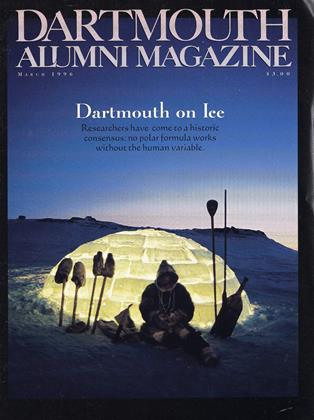As I scanned the obituaries of a recent issue of the Dartmouth Alumni Magazine, I noted the death of a young graduate—someone from the class of 1970—who had served on the board of a local AIDS project. It led me to wonder whether he had succumbed, as so many others have, to complications of HIV.
At my twentieth class reunion I attended a memorial service for those in the classes of 1973,1974, and 1975 who had died. A number of those I recognized on the long list were classmates known or assumed to be gay. I can only surmise that AIDS claimed many of their lives, as it certainly has the lives of others whose sexual preferences were less apparent. AIDS is now the most common cause of death among men ages 25 to 44, surpassing heart disease, motor vehicle accidents, and cancer. As such this illness, unknown at the time of my graduation in 1974, is today the number one killer of my classmates. Yet AID S was not mentioned at the memorial service.
I was disheartened at the omission.
AIDS has been part of my life ever since 1986, when, as a medical student, I helped care for Belinda, a four-year-old infected with the virus since birth. She died alone in a Bronx hospital room, an intravenous line in her arm and an oxygen mask plastered to her bony face. When she stopped breathing, nurses called me in to see her. Examining her stick-like corpse, I recalled Belinda's last plea spoken to me, among others, as I'd left her room earlier that afternoon: "Stay with me."
Over the past five years working as a family physician in an urban area, I have seen HIV routinely, most often in the form of young people whose paths had intersected, however briefly or indirectly, with intravenous drug use.
Recently I discovered that a friend, an attorney, has been HIV-positive for years. Learning his HIV-status was shocking. He looks the picture of health. He is fanny, boyishly charming, my age.
As I reviewed the names of fallen classmates, I thought about my friend and my patients, about our classmates and today's undergraduates. About those we have lost and those we will lose. We are all, as members of the Dartmouth family, tied to this modern plague. Might we create an atmosphere where the link could be acknowledged and openly explored? A cure may be far off.
While we await scientific advances, the most soothing balm we have lies in the realization that, gay and straight, infected or not, our common humanity is more fundamental than anything which separates us. The bell, as John Donne so eloquently put it, is tolling for us all.
Paul Gross, M.D., is on the facultyof St. Joseph's FamilyPractice Residency in Yonkers,New York.
 View Full Issue
View Full Issue
More From This Issue
-
 Cover Story
Cover StoryCan Science Save the Arctic?
March 1996 By Lynn Noel '81 -
 Feature
FeatureDartmouth's Productivity
March 1996 By James Wright -
 Feature
FeatureThe Left Fielder's Glove
March 1996 By JOHN MONAHAN -
 Feature
FeatureBAKER'S DOZEN
March 1996 -
 Article
ArticleDr. Wheelock's Journal
March 1996 By "E. Wheelock" -
 Article
ArticleSpace Politics
March 1996 By Karen Endicott









